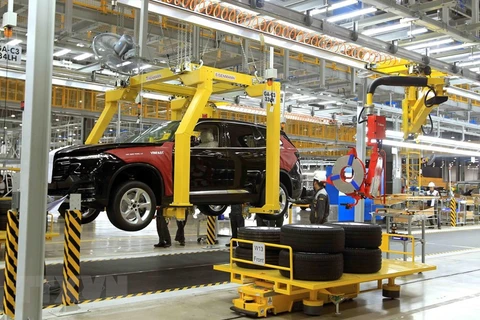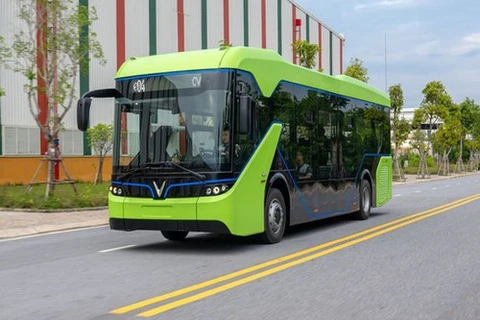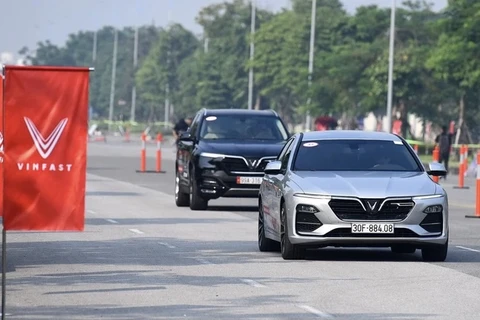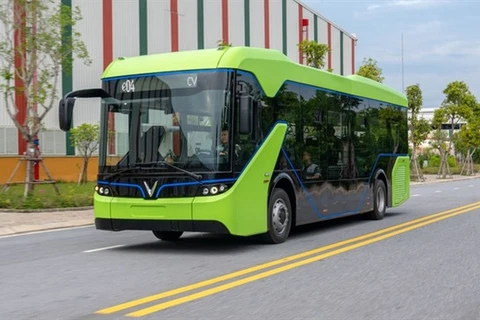 The Vinbus Ecology Transport Services Limited Liability Company (VinBus), a member of Vietnamese conglomerate Vingroup, launched the first smart e-bus service in the country on April 8. According to Vinbus Deputy Director General Nguyen Van Thanh, the buses are running on a trial basis in the Vinhomes Ocean Park urban area in Gia Lam district of Hanoi while awaiting the completion of procedures to connect with the city's public transport network. These vehicles have an eye-catching design and they are powered by electricity, which is believed to be more environmentally friendly than fossil fuels. VinBus is an electric bus model manufactured and assembled by VinFast at its automobile production complex in the northern city of Hai Phong. (Photo: VietnamPlus)
The Vinbus Ecology Transport Services Limited Liability Company (VinBus), a member of Vietnamese conglomerate Vingroup, launched the first smart e-bus service in the country on April 8. According to Vinbus Deputy Director General Nguyen Van Thanh, the buses are running on a trial basis in the Vinhomes Ocean Park urban area in Gia Lam district of Hanoi while awaiting the completion of procedures to connect with the city's public transport network. These vehicles have an eye-catching design and they are powered by electricity, which is believed to be more environmentally friendly than fossil fuels. VinBus is an electric bus model manufactured and assembled by VinFast at its automobile production complex in the northern city of Hai Phong. (Photo: VietnamPlus)  VinBus is an environmentally friendly bus model powered by electricity instead of petrol. Each bus is equipped with an automated system able to control the driver’s behaviours and give warnings about unsafe situations, an on-board loudspeaker system, free wifi, USB charging ports, and security cameras, among others. With a battery capacity of 281 kWh, the bus can travel between 220 and 260 kilometres on a single charge. It can fully recharge in just two hours at VinBus’s 150 kW charging stations. VinBus is scheduled to provide public transport services in five major cities in the country, namely Hanoi, Hai Phong, Da Nang, Ho Chi Minh City, and Can Tho. (Photo: VietnamPlus)
VinBus is an environmentally friendly bus model powered by electricity instead of petrol. Each bus is equipped with an automated system able to control the driver’s behaviours and give warnings about unsafe situations, an on-board loudspeaker system, free wifi, USB charging ports, and security cameras, among others. With a battery capacity of 281 kWh, the bus can travel between 220 and 260 kilometres on a single charge. It can fully recharge in just two hours at VinBus’s 150 kW charging stations. VinBus is scheduled to provide public transport services in five major cities in the country, namely Hanoi, Hai Phong, Da Nang, Ho Chi Minh City, and Can Tho. (Photo: VietnamPlus)  Coloured light green, the vehicles feature a modern look with large windows on four sides. The VinBus company operates under a non-profit model with a view to developing a modern public transportation network that helps reduce air and noise pollution in major cities of Vietnam. In March, Deputy Prime Minister Trinh Dinh Dung agreed in principle for Hanoi to temporarily apply the economic and technical norms and unit cost for buses using the compressed natural gas (CNG) in the city to electric buses. Based on the e-bus service trial results, the municipal People’s Committee will join hands with competent ministries to set up and issue economic-technical norms for the electric buses. (Photo: VietnamPlus)
Coloured light green, the vehicles feature a modern look with large windows on four sides. The VinBus company operates under a non-profit model with a view to developing a modern public transportation network that helps reduce air and noise pollution in major cities of Vietnam. In March, Deputy Prime Minister Trinh Dinh Dung agreed in principle for Hanoi to temporarily apply the economic and technical norms and unit cost for buses using the compressed natural gas (CNG) in the city to electric buses. Based on the e-bus service trial results, the municipal People’s Committee will join hands with competent ministries to set up and issue economic-technical norms for the electric buses. (Photo: VietnamPlus)  Each VinBus vehicle features 25 seats and 47 grab handles, enabling it to carry a maximum of 72 passengers. In December 2019, Vingroup proposed the operation of 10 e-bus routes in the capital city, and committed to investing in 150 - 200 high-end electric buses. In May the same year, the conglomerate said VinBus, its subsidiary specialising in transport services, will operate with a chartered capital standing at 1 trillion VND (about 43 million USD). It will run as many as 3,000 electric buses manufactured by VinFast, another Vingroup’s subsidiary to meet travel demand and contribute to the development of a public transport network that helps reduce gas and noise emissions. (Photo: VietnamPlus)
Each VinBus vehicle features 25 seats and 47 grab handles, enabling it to carry a maximum of 72 passengers. In December 2019, Vingroup proposed the operation of 10 e-bus routes in the capital city, and committed to investing in 150 - 200 high-end electric buses. In May the same year, the conglomerate said VinBus, its subsidiary specialising in transport services, will operate with a chartered capital standing at 1 trillion VND (about 43 million USD). It will run as many as 3,000 electric buses manufactured by VinFast, another Vingroup’s subsidiary to meet travel demand and contribute to the development of a public transport network that helps reduce gas and noise emissions. (Photo: VietnamPlus)  The new vehicles are as big as the large buses powered by internal combustion engines currently operating in Hanoi. They are spacious inside. Each of the new buses is equipped with modern technology to improve safety and provide convenient services for passengers on board. German industrial manufacturing company Siemens is the provider of technology and components for VinFast’s factory on electric buses. Vingroup Vice President and General Director Nguyen Viet Quang said the conglomerate has set itself a target of developing and popularising environmentally-friendly vehicles which uses electricity, and gradually replacing those run on petrol. It is also a significant move of the group to offer new services and experiences in high-technology application to passengers. (Photo: VietnamPlus)
The new vehicles are as big as the large buses powered by internal combustion engines currently operating in Hanoi. They are spacious inside. Each of the new buses is equipped with modern technology to improve safety and provide convenient services for passengers on board. German industrial manufacturing company Siemens is the provider of technology and components for VinFast’s factory on electric buses. Vingroup Vice President and General Director Nguyen Viet Quang said the conglomerate has set itself a target of developing and popularising environmentally-friendly vehicles which uses electricity, and gradually replacing those run on petrol. It is also a significant move of the group to offer new services and experiences in high-technology application to passengers. (Photo: VietnamPlus)  During its test run, the buses will run in the Vinhomes Ocean Park urban area in Gia Lam district of Hanoi, while awaiting the completion of procedures to connect with the city's public transport network. VinBus is designed as a smart e-bus model. In late 2020, the company and Advantech VN signed a strategic cooperation agreement on developing a smart bus management system. The system will include artificial intelligence-based cameras for monitoring drivers, wifi routers, devices for monitoring bus routes and security, and a software for fleet information management. A senior official of Vingroup said the production of safe, comfortable and high-quality electric buses is a solution to the poor public transport infrastructure in Vietnam. (Photo: VietnamPlus)
During its test run, the buses will run in the Vinhomes Ocean Park urban area in Gia Lam district of Hanoi, while awaiting the completion of procedures to connect with the city's public transport network. VinBus is designed as a smart e-bus model. In late 2020, the company and Advantech VN signed a strategic cooperation agreement on developing a smart bus management system. The system will include artificial intelligence-based cameras for monitoring drivers, wifi routers, devices for monitoring bus routes and security, and a software for fleet information management. A senior official of Vingroup said the production of safe, comfortable and high-quality electric buses is a solution to the poor public transport infrastructure in Vietnam. (Photo: VietnamPlus)  There are charging facilities at the VinBus depot, and all the electricity provided to the buses comes from solar power panels installed on the roof of the garage. VinBus vehicles are assembled at the VinFast factory in Hai Phong city. Their electric motors use 281kWh batteries and are placed at the rear, enabling the buses to travel 200 - 260 kilometres on a single charge. Unlike current buses using internal combustion engines, the new electric vehicles emit neither gas nor noise. They are also fully equipped with a drive behaviour monitoring and warning system, along with extrication tools and firefighting equipment to ensure safety for passengers. (Photo: VietnamPlus)
There are charging facilities at the VinBus depot, and all the electricity provided to the buses comes from solar power panels installed on the roof of the garage. VinBus vehicles are assembled at the VinFast factory in Hai Phong city. Their electric motors use 281kWh batteries and are placed at the rear, enabling the buses to travel 200 - 260 kilometres on a single charge. Unlike current buses using internal combustion engines, the new electric vehicles emit neither gas nor noise. They are also fully equipped with a drive behaviour monitoring and warning system, along with extrication tools and firefighting equipment to ensure safety for passengers. (Photo: VietnamPlus)  Each of the new buses is equipped with modern technology to improve safety and provide convenient services for passengers on board. They feature screens informing passengers about coming stops, USB charging ports, front view cameras, and rear view cameras, among others. VinBus is reportedly the first electric bus brand in Vietnam, expected to develop an environmentally friendly bus model to help reduce greenhouse gas emissions. The firm plan to put about 200 electric buses into use in Hanoi, Ho Chi Minh City, and Phu Quoc Island. It will also open 15 e-bus routes to connect the Vinhomes urban areas with the centres of Hanoi and Ho Chi Minh City. (Photo: VietnamPlus)
Each of the new buses is equipped with modern technology to improve safety and provide convenient services for passengers on board. They feature screens informing passengers about coming stops, USB charging ports, front view cameras, and rear view cameras, among others. VinBus is reportedly the first electric bus brand in Vietnam, expected to develop an environmentally friendly bus model to help reduce greenhouse gas emissions. The firm plan to put about 200 electric buses into use in Hanoi, Ho Chi Minh City, and Phu Quoc Island. It will also open 15 e-bus routes to connect the Vinhomes urban areas with the centres of Hanoi and Ho Chi Minh City. (Photo: VietnamPlus)  In the initial period, VinBus vehicles are limited to Vinhomes Ocean Park urban area in Gia Lam district of Hanoi, running from 5am to 10pm with one trip every 10 - 20 minutes. The company said it has completing the installation of ticket offices. However, ticket prices have yet to be announced. VinBus also noted that an electronic ticket system and cashless payment methods like card, e-wallet, and QR code for its e-bus service are being considered. With a battery capacity of 281 kWh, the buses can travel between 220 and 260 kilometres on a single charge. They can fully recharge in just two hours at VinBus’s 150 kW charging station network. (Photo: VietnamPlus)
In the initial period, VinBus vehicles are limited to Vinhomes Ocean Park urban area in Gia Lam district of Hanoi, running from 5am to 10pm with one trip every 10 - 20 minutes. The company said it has completing the installation of ticket offices. However, ticket prices have yet to be announced. VinBus also noted that an electronic ticket system and cashless payment methods like card, e-wallet, and QR code for its e-bus service are being considered. With a battery capacity of 281 kWh, the buses can travel between 220 and 260 kilometres on a single charge. They can fully recharge in just two hours at VinBus’s 150 kW charging station network. (Photo: VietnamPlus)  The electric buses have an eye-catching design, and they are powered by electricity, which is believed to be more environmentally friendly than fossil fuels. VinBus is an electric bus model manufactured and assembled by VinFast at its automobile production complex in the northern city of Hai Phong. Apart from electric buses, VinFast said in late March that it is taking pre-orders for its first electric vehicle model VF e34 priced at 690 million VND (29,820 USD). It is also producing electric motorbikes. VinFast said it is building a network of about 40,000 charging stations across the nation by the end of this year. The launch of high-tech electric vehicles is part of its pre-defined roadmap since entering the automotive market three years ago. (Photo: VietnamPlus)
The electric buses have an eye-catching design, and they are powered by electricity, which is believed to be more environmentally friendly than fossil fuels. VinBus is an electric bus model manufactured and assembled by VinFast at its automobile production complex in the northern city of Hai Phong. Apart from electric buses, VinFast said in late March that it is taking pre-orders for its first electric vehicle model VF e34 priced at 690 million VND (29,820 USD). It is also producing electric motorbikes. VinFast said it is building a network of about 40,000 charging stations across the nation by the end of this year. The launch of high-tech electric vehicles is part of its pre-defined roadmap since entering the automotive market three years ago. (Photo: VietnamPlus) VNA

























